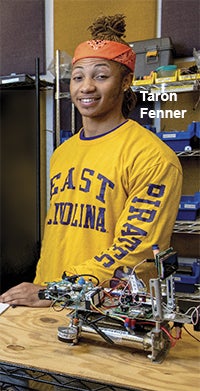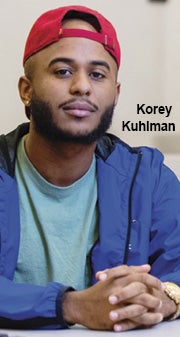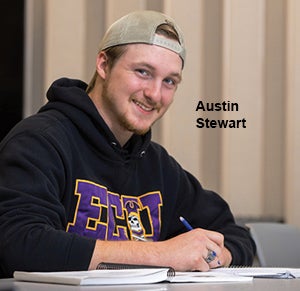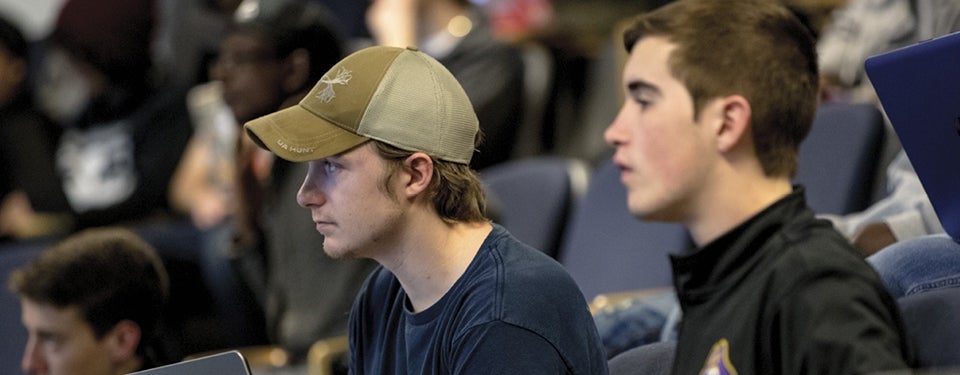Hitting Their Stride
 You could describe Taron Fenner as determined.
You could describe Taron Fenner as determined.
He’s made the dean’s list every semester. He’s an R.A. at his residence hall. His eyes are firmly on his May 2019 graduation date; he’s not planning to be at East Carolina University any longer. And he and his classmates are watching out for one another to make sure they all stay on target.
“We pretty much rely on each other,” says Fenner, an engineering major from New Jersey. “I do see people falling off track, but with it being a group thing, it’s a matter of having that positive surrounding. It’s something that’s uplifting. You see your friend doing whatever he has to do-it makes you better yourself. If anything, it’s uplifting each other.
“Especially here at ECU,” he adds. “There’s so many opportunities.”Those are words that should please university leaders, because they’re staring at a problem that could derail other would-be Taron Fenners on campus: Male students are falling behind and falling out of college at a growing rate.

“Males are lagging in a lot of different areas,” says Kathy Hill, director of assessment in the ECU Division of Student Affairs. “Retention and graduation rates-it’s about a 10 percent difference on average.
The last couple of years, folks really started to see that.”
But Hill and others are working to stop and then reverse that trend with programs such as the Male Student Success Summit, which Fenner and Korey Kuhlman attended in January.
Kuhlman, junior business management major, is the first in his family to graduate from high school.
“I have a little brother who’s 7,” Kuhlman says. “I want to lead by example.”
Numbers tell the story
Higher education in the United States was once an essentially male domain, but by the 1970s the vast majority of colleges and universities were co-educational. Women’s educational levels lagged behind men’s for some time, but according to a 2011 report by the Pew Research Center, that changed around 1990. That year, women surpassed men’s attainment levels, and since then the gender gap has continued to grow.
That trend is manifesting itself at ECU, which traditionally has had more women than men enrolled, but in recent years has seen those male students slip further behind their female classmates in persistence, retention and graduation. Administrators and faculty members are looking to turn the tide.
An Internet search for “male student success” returns links mostly related to black male college students. The issue is more widespread, Hill says.
“It’s all males, across the board, regardless of what their racial background is,” she says.
For example, university figures show that almost 70 percent of males who didn’t return to school after their freshman year had a GPA under 2.0. For females, more than 70 percent had GPAs above 3.0.
Other university statistics show first-time, full-time male students in fall 2012 received a higher number of academic alerts than females-41 percent to 26 percent. And they attended tutoring at a lower rate than females upon receiving an alert-45 percent to 21 percent, or about 1 in 5. However, for those men who attended tutoring, retention was similar to that of the women’s retention-85 percent to 84.9 percent.
Graduation rates also show a gap. Between 2003 and 2009, six-year graduation rates among women ranged from 57.8 to 62.6 percent. Among men, it ranged from 50.2 percent to 55.8 percent-generally about the 10 percentage point difference Hill cited.
A similar gender gap in retention rates exists at ECU’s two most closely aligned UNC system institutions-UNC-Charlotte and UNC-Greensboro-though the rate is less at those schools, according to university figures.
National numbers show similar trends. A 2010 study from the University of Washington found the higher academic performance of women at the outset of college suggests that they enter better prepared for college’s academic rigors and are less likely to delay their education or drop out of school.
Another 2010 study, this one from the Pew Research Center, found a higher percentage of women see college as being advantageous than do men, and more women than men see college as providing a good value.
To ECU senior Kaitlyn Draughn, such figures are obvious.
“Males kind of have this attitude that I can make it even with a high school diploma,” says the marriage and family therapy major from Winston-Salem. She was working at the second annual Male Student Success Summit at ECU in January as part of her internship.
“Education is pushed on women so much,” she says. “Growing up, I was told as a woman you’re not going to get anywhere without an education. Men, I just feel like….
“You meet so many older men who are successful with just a high school diploma, and that’s inspiring,” she continues.
But that’s not the case today?
“Yeah.”
“I’m going for myself,” she adds. “I think everyone realizes with hard work comes great things. I already know as a woman I have to work harder than a man to get what I want.”
She goes on to say she tried to get her boyfriend to come to the event, suggesting he might benefit from it.
“He was like, ‘I just want to sleep,'” she says. “He’s struggling to find himself.”
Mason Church looks the part of a college student-tall with a goatee and tan skinny jeans. If you guess he came to college to major in art, you’d be wrong. He started in a pre-med curriculum, because, he says, becoming a doctor seemed like a good way to be able to pay bills.
That didn’t work; he’s not a science person, he says. Neither did his next major, finance; accounting gave him trouble. That’s why he’s taking a year off from school. He says he plans to re-enroll in the fall in economics in the Thomas Harriot College of Arts and Sciences and minor in art, which is what he says he would have majored in if he could have a do-over.
He’s Draughn’s boyfriend.
“It’s all about me just trusting people too much instead of doing what I want to do,” he says. He graduated from a magnet high school in Winston-Salem; his sister just graduated from Davidson, so it’s not that college is too hard for someone like him, he says. It’s that he didn’t make the right choices.
“Now that I know that, I need to get out of the rut of doing what my parents want me to do,” he says. “I feel like guys are a little more susceptible to the pressure. People just need to experience life before they get pushed into college.”
One student’s story
Sophomore Austin Stewart credits one of his professors with getting him back on track after a poor first semester.
“Coming to ECU with the amount of stuff they have and the amount of teachers was a culture shock to me,” says Stewart, who’s from Scotland Neck, a Halifax County town with a population of about 2,000 best known for its Sylvan Heights Bird Park. He graduated from Hobgood Academy, a small private school about 8 miles from Scotland Neck.

“All the stories about them saying your first year is the hardest are right,” he says. “Without someone there telling me I need to do this and this…I guess I took too much advantage of my free time to do what I wanted to do instead of what I needed to do.
“I was lazy for lack of a better word,” he says.
Lathan Turner, associate director of student transitions at ECU, was teaching the section of COAD 1000, a class some freshmen take, and Stewart was one of his students. He noticed the freshman was having trouble and stepped in. He got Stewart a job at Mendenhall Student Center-one that required him to maintain his grades.
“If it wasn’t for the COAD professor, Dr. Turner, I wouldn’t have this job and probably wouldn’t still be at ECU,” Stewart says.
Turner helped organize Project MORE at ECU. MORE stands for male outreach, retention and engagement and includes workshops such as the Male Student Success Summit and other resources to help male students not fall behind on their studies. The first step is often recognizing they need help and asking for it.
“It’s just a lot of times the young man doesn’t want to come forward,” he says.
The university is also creating a living-learning community this fall called The League, centered on an interest in athletics and focusing on promoting male student success.
Changing structures
Advising is a key starting point for helping students get started on the right track and catch them if they start to get off it, says Henry Peel ’79 ’80, who joined the ECU education faculty in 1989 and served as associate dean and interim dean among other university positions. He was part of a team that worked to create a professional advising staff.
“Prior to that, a good deal of advising was done by faculty,” says Peel, who retired around 2010 and now is chief of staff at Florida Southwestern State College in Fort Myers. “There was a real shared vision among the deans and administrators that we needed to look at personalizing advising. The bigger it was getting, the worry was we would lose that.
“We just didn’t want students to get lost,” says Peel, who was a teacher, assistant principal and high school guidance counselor before joining ECU. A system was created where advisors would keep tabs on student performance and call them in if they were having problems with grades, attendance or other issues. Students also knew where to turn if they needed help.
“They knew one person they could go to and that’s their advisor,” Peel says. “The personalization is just very important for student success.”
Sometimes, other obstacles keep students from graduating. Peel says when he began working in Florida, he learned the university system there had a $50 graduation fee. It’s not clear exactly what it was for.
“But some students actually never went through graduation because of the fee,” Peel says. “That’s a small thing, but it’s an example of the things you learn when you look at thing systematically and learn what the stumbling blocks are.”
Florida erased the fee, and Peel says graduation rates climbed 3 percent.
Another case is the student who’s gathered plenty of credits but can’t matriculate into a degree program or decides the program they’re in isn’t for them. ECU created the university studies degree in 2014 with those students in mind. Peel said the idea was being talked about before he retired.
“After they get to a point where they realize ‘I don’t want to be a teacher’ or ‘I don’t want to be a nurse,’ for them to be able to be a college graduate is very important,” he says. “We don’t want them to be forced to stay in their major just to be a college graduate.”
What’s ahead?
While college and university leaders have had an eye on student success for years, Peel believes the issue moved more into the public eye as state legislatures began seeking accountability from the education system due to escalating costs.
For example, he says, Florida awards funding to colleges and universities based on graduation rates. In North Carolina, the Legislature has changed the N.C. Guaranteed Admission Program from one that deferred university admission of some students, instead steering them to community colleges, to one that requires universities to make plans for improving four-year graduation rates.
ECU is focusing on three groups: first-time full-time freshmen, Pell Grant recipients and first-generation students. They’ll focus on selecting courses, completing necessary hours each semester, counseling, campus involvement, and understanding credit and debt.
“We really want to reestablish the culture at ECU that students should complete in four years. We label ourselves as a four-year school and we should be one,” said ECU Provost and Senior Vice Chancellor for Academic Affairs Ron Mitchelson.
The five-year goal is to increase four-year graduation rates to 46 percent from 37 percent, according to university officials.
In the area of male student success, Hill and others who are leading ECU’s efforts say improvement will require a “systems change” strategy that includes reframed tutoring, mentoring and support services to attract and engage male students; male-targeted programming and wellness initiatives; male mentoring and coaching initiatives; and more.
And it will also take men watching out for each other. Kuhlman, the business management major, says knowing about the issue is “half the battle.” And sticking together is a big part of the other half.
“If you want to be successful in anything you want to do, you have to have friends who have the same goals,” he says. “You have the power to be successful.”
